China is secretly worried Donald Trump will win on trade
In seeking to achieve accord with the US despite the trade battle and other geopolitical shifts, Beijing wants to avoid becoming isolated like the Soviet Union during the Cold War.
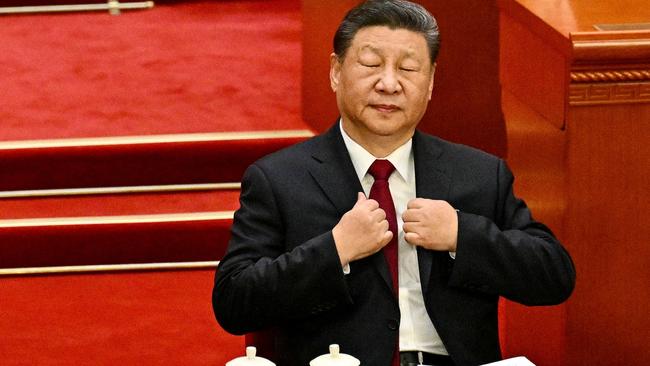
Soon after Donald Trump won the US presidential election in November, Xi Jinping asked his aides to urgently analyse the Cold War rivalry between the United States and the Soviet Union.
His concern, according to people who consult with senior Chinese officials, was that as President Trump gears up for a showdown with Beijing, China could get isolated like Moscow during that era.
He’s not wrong to worry. Even though Trump may be the one who currently looks isolated on the world stage – picking trade fights with erstwhile allies like Mexico and Canada, alarming Europe over his handling of the war in Ukraine and vowing to annex Greenland and the Panama Canal – the truth is that China doesn’t hold a strong hand.
With a domestic economy in crisis, Xi is playing defence, hoping to salvage as much as possible of a global trade system that helped pull his country out of poverty.
Across the Pacific, Trump is intent on rewiring that very trading system, which he and his advisers see as having benefited the rest of the world – and China most of all – at the US’s expense.
It isn’t just trade. The competing agendas of the leaders of the world’s two largest economies are poised to lead to precisely what China is trying to avoid: a superpower clash not seen since the Cold War, an all-encompassing rivalry over economic, technological and overall geopolitical supremacy.
Trump, who highlighted the need to counter China throughout his campaign, returned to the White House with a comfortable victory and Republican control of Congress. He believes he can deal with Beijing from a position of strength, advisers said.
Many of his early diplomatic moves should be viewed in that context, these people said. Trump is trying to end the conflicts in the Middle East and Ukraine to better focus on China, they said. His recent enthusiastic embrace of Russia and its authoritarian leader, Vladimir Putin, is propelled in part by a strategic desire to drive a wedge between Moscow and Beijing.
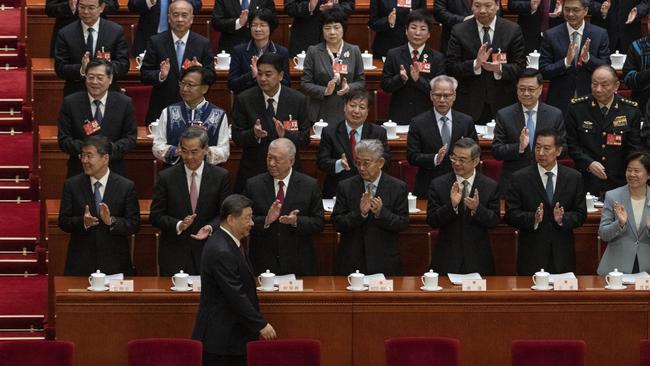
One reason Trump wants US control of the Panama Canal is that he sees the Chinese infrastructure that has been built up there in the past three decades as a national-security threat.
On Tuesday, he notched a victory of sorts, when a consortium of investors led by US asset management firm BlackRock agreed to buy majority stakes in ports on either end of the Panama Canal from Hong Kong-based CK Hutchison.
“All the stuff he’s doing is so that we can put more resources” to counter China, an administration official said.
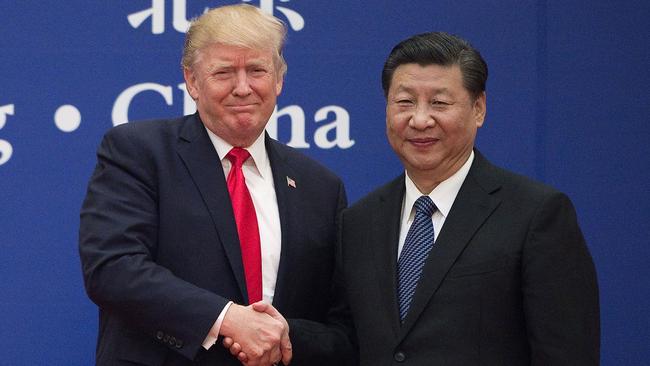
Trump on Tuesday added to existing tariffs on China, citing its role in the fentanyl crisis in the US, surprising Chinese officials who were still trying to figure out how to approach what they see as an erratic US leader.
China, which itself has tried to reshape the global order, aligning itself with Russia to challenge the West, now finds itself on the back foot. The vision haunting Xi is one where China finds itself cut off by trade restrictions and sanctions, suffering Soviet-style isolation with fewer outlets for its goods and limited access to crucial technologies.
“Now China is in danger of becoming the target of a similar rivalry,” one of the people who consult with Beijing said. “Xi believes that must be avoided.”
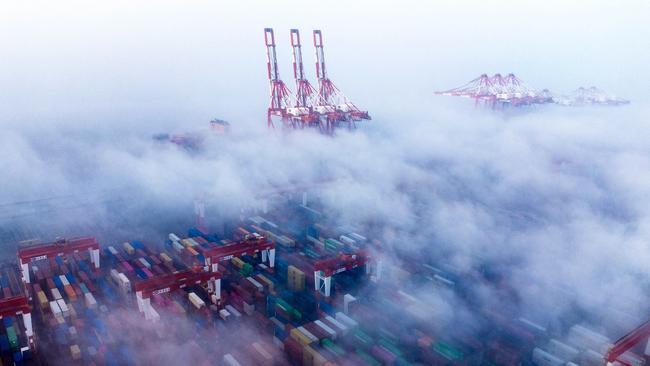
What complicates Beijing’s efforts at shaping its strategy toward the US is the difficulty in getting Trump’s core team to engage. China hasn’t been a primary focus for Trump in his first weeks. His near-term priorities have been on fixing illegal immigration, slashing government spending and ending Russia’s war in Ukraine.
While Xi is waiting for clarity on what the US wants from Beijing, his economic team is preparing ways to hit back at Trump.
Since November, China has dispatched several delegations to Washington to explore potential deals with the new administration, arguing that tariffs would add to the inflationary pressure in the US that Trump is trying to tame.
Simultaneously, Beijing has developed an arsenal of tools – such as export controls on critical minerals – to inflict economic pain on the US and has been courting America’s traditional partners to prepare for a more intense face-off with Washington.
One lesson Xi has learned from the first trade war with Trump is that China has more to lose from hitting back at Trump’s tariff hikes with proportional levy increases, the people said, as the US buys substantially more from China than the other way around.
Michael Pillsbury, a China expert at the conservative Heritage Foundation who consults with the administration, said he has met with members of Chinese delegations that have visited Washington since the election. The Chinese effort amounts to a campaign to ward off tariffs, he said.
“They are kind of desperate,” Pillsbury said. “Their economy is in trouble. Now that Trump put the tariffs on, they know this campaign has failed.”
Still, as Washington amps up pressure, Beijing is trying to project confidence. After Trump’s latest tariff actions this week, China swiftly retaliated. Meanwhile, Beijing set a growth target of about 5 per cent for 2025, a signal that it expects the Chinese economy to resist the rising trade pressures. A Chinese Foreign Ministry spokesman took a defiant stance, saying, “If war is what the US wants, be it a tariff war, a trade war or any other type of war, we’re ready to fight till the end.”
‘Let the Chinese stew’
Trump and Xi seemed to be off to a good start, similar to the beginning of Trump’s first term in 2017. The American leader invited Xi to his January 20 inauguration, and while the Chinese leader sent his vice president instead, it was still a goodwill gesture from a leadership often wary of political risks. Both leaders have expressed an interest in having a summit.
Such diplomatic niceties, however, only mask the actions beneath – and what likely is in store for China.
Trump’s “America First” policy essentially calls for dismantling the norms set up by the World Trade Organisation since 1995. Under those norms, China has been able to flood the world with cheap exports while limiting foreign access to its own market. China’s $US295 billion ($465bn) trade surplus with the US is the widest of any US trading partner.
Matt Turpin, a visiting fellow at the Hoover Institution who served on Trump’s National Security Council during his first term, said Trump believes that US interests, especially those of American workers and companies, are harmed by the liberal international economic system that developed after the Soviet Union’s collapse.
To re-engineer the system, Turpin said, Trump’s trade team may “focus on getting relatively favourable deals with everyone else first and let the Chinese stew in their continuing economic depression”.
The people close to the administration said Trump believes that the US can strengthen its leverage over Beijing by individually renegotiating terms of trade with its other partners.
On his first day in office, Trump signed a presidential memorandum directing federal agencies to conduct a series of reviews of the US’s existing trade relationships. One key task for his economic team is to cut deals with countries like Mexico and Vietnam, part of efforts to prevent Chinese companies from rerouting goods to the US through third parties.
After Trump first threatened to hit Mexico and Canada with 25 per cent tariffs in early February, Mexico made a “very interesting proposal” to match the US on tariffs for imports from China, Treasury Secretary Scott Bessent told Bloomberg TV.
Following a pause, Trump on Tuesday followed through on his tariff threat, arguing that the two countries still hadn’t firmed up their policies to stop migrant and drug flows across the border. A day later, the White House said it will give automakers a one-month exemption from the new levies.
‘Sticks and leverage’
The effort to isolate China economically isn’t limited to tariffs, which Trump had said could go as high as 60 per cent.
Other actions being considered by his trade team – Treasury’s Bessent, Secretary of Commerce Howard Lutnick and US Trade Representative Jamieson Greer – include restricting Chinese investment in the US and US investment in China, targeting industries dominated by China, such as shipbuilding, as well as further limiting the sale of high-tech products to Chinese companies. Rather than hurting the US, the administration believes export controls will make the economy stronger.
At the same time, Trump himself has held out the prospect of making a fresh deal with China. “It’s possible, it’s possible,” he said last month. And he has continued to call Xi a “good friend’’, just as he did during his first presidency.
The people close to the administration said ultimately, the US may push China to agree to make “structural changes” in the way it runs the economy – a deal that Xi is unlikely to accept given his emphasis on central control to manage the economy. China generally abhors what it sees as any outside attempt to challenge the Communist Party’s governance.
The people point to as a template a proposed deal Beijing rejected in May 2019, after rounds of intense negotiations during the height of the trade war with the first Trump administration. That deal proposed changes in Chinese laws to prohibit theft of American technology and to better protect American companies operating in China – changes Xi found unacceptable.
Trump isn’t in a rush to negotiate with Xi because of the US’s economic strength, the people said. The administration is developing “a lot of sticks and leverage” that can be used in negotiations, said one of the people.
Trump also continues to believe that he can take actions like tariffs, while simultaneously expecting that his personal relationship with Xi can result in the two countries finding some common ground, the people said.
Rivals, partners
It was during Trump’s first four years in the White House, from 2017 to 2020, that the US policy toward China underwent a major makeover. The longstanding strategy of deepening economic ties and cooperative engagement with Beijing was replaced by one characterised by estrangement, including increased tariffs and tech restrictions.
Even though President Joe Biden continued the assertive approach, his administration largely kept the relationship on an even keel. Scores of channels of communication with Beijing were revived under Biden.
Now, much to the chagrin of Beijing, Trump in his second term is both less restrained and more determined, paving the way for even more intense US-China storms.
In meetings with American business and thought leaders in recent months, Xi and his aides have repeatedly conveyed Beijing’s desire to be a partner with the US, not an outright adversary, according to people who attended the gatherings.
“They’ve studied Trump carefully and have a pretty realistic view of the situation,” said Graham Allison, former dean of Harvard Kennedy School who has met with Xi and other senior Chinese officials in the past year. “Xi has been vocal about his effort to conceptualise the relationship as one where the US and China are both rivals and partners simultaneously.”
Trump’s one-two tariff punch in the past weeks has exposed pitfalls in Beijing’s wait-and-see approach toward Washington.
Since Trump slapped the initial 10 per cent tariffs on Chinese goods in early February, according to the people close to Beijing’s thinking, China’s leadership has been holding out for the Trump team to make specific demands, in hopes that those asks could lead to a broader discussion.
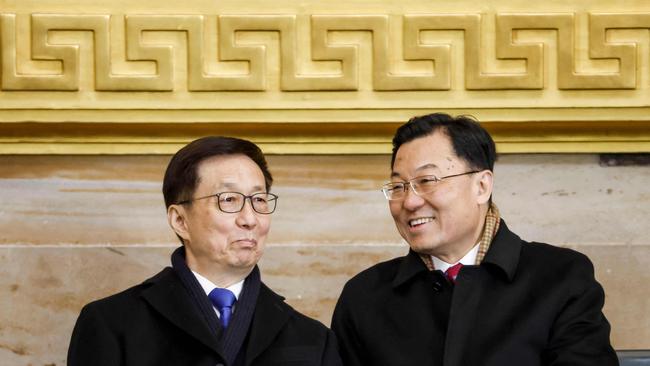
Xi isn’t interested in making an offer just on the opioid fentanyl, the people said. Rather, they said, Xi hopes to engage Trump in dialogue that can lead to a more comprehensive agreement and define the overall relationship.
Xi’s envoy to Trump’s Jan. 20 inauguration, Vice President Han Zheng, told Trump officials about Beijing’s willingness to discuss a range of topics including fentanyl and trade, the people said.
The 10 per cent additional tariff move by Trump this week, one of the people said, was “pretty unexpected”, while adding, “the Chinese side has been holding out for the US side to come to the table with conditions.”
The Wall Street Journal







To join the conversation, please log in. Don't have an account? Register
Join the conversation, you are commenting as Logout